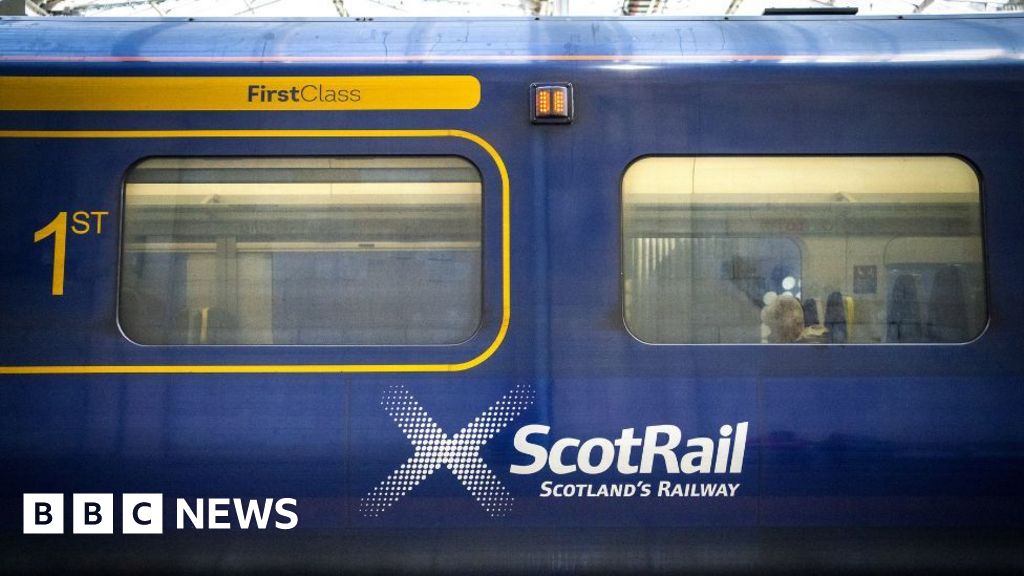World
Rail pay dispute will spread across Scotland – union – BBC News

A pay dispute involving train drivers will spread across Scotland’s public sector, a trade union chief has warned.
Kevin Lindsay, Scotland organiser for Aslef, said train drivers were likely to launch industrial action due to a “derisory” pay offer from ScotRail.
The publicly-owned rail firm has slashed 600 services and introduced an emergency timetable after four unions rejected a deal last week.
ScotRail has apologised to customers and said it is “fully committed” to further talks with unions.
Aslef, Unite, RMT and TSSA staff have rejected a three-year deal running from this April until 2027 which would see workers get a 2% rise each April then a 1% rise the following January.
Drivers have subsequently decided not to work on their days off.
He said that following a consultation with the union’s national executive, workers were likely to be balloted on industrial action.
Image source, Getty Images
“It’s not just going to be Aslef that are going to be balloting – RMT, Unite, TSSA union going to ballot as well,” Mr Lindsay said.
“This is going to spread right across the whole of the public sector in Scotland until the Scottish government get real.”
The Aslef organiser said First Minister John Swinney had set out the government’s pay policy in a meeting with 18 unions at his official residence, Bute House. He claimed Mr Swinney’s comments were “parroted” by ScotRail.
“It’s a fait accompli, a take it or leave it, and our members have told me they’re leaving it,” he said.
“There has been no negotiation so I can understand the frustration of Scotland’s train drivers.”
Drivers’ salaries
According to ScotRail, the full-time salary for newly-qualified train drivers is £43,645, not including overtime payments.
This rises to £46,614 after six months and £50,063 after nine months. Following a three-year post-qualifying period the full-time salary is £55,265.
Figures released under freedom of information, published by The Scottish Mail on Sunday, showed that about a quarter of ScotRail’s 1,250 drivers earned more than £70,000 last year, with half grossing between £60,000 and £70,000.
About 80 were paid £80,000, and one was paid £103,000 – including more than £45,000 in overtime.
ScotRail, which was nationalised in 2022, warned that peak-time services between Glasgow and Edinburgh in the morning and late afternoon would have their frequency halved from four trains per hour to two because of the latest staff shortage.
The emergency steps taken by ScotRail to try to provide more certainly for passengers highlights a big long term problem – it simply does not have enough drivers.
To keep the full timetable running, it relies on drivers agreeing to do overtime and work on rest days. This working is entirely voluntary.
In recent days fewer drivers than normal have been available to do overtime amid an escalating row over pay.
However, it is important to note the rail unions are not taking industrial action – even though the practical effect of the decisions many drivers have taken is similar to that of an official overtime ban.
ScotRail is not alone – most rail companies in the UK are also reliant on overtime from drivers to fulfil their timetables.
The last pay dispute at ScotRail was two years ago, shortly after the train company was brought back into public ownership by the Scottish government.
The company agreed to recruit and train more new drivers to reduce its reliance on overtime – but this takes time.
ScotRail managing director Joanne Maguire said it had been a “challenging few days” for the firm following the “very tough” decision to introduce a temporary timetable.
She apologised and said the move was designed to provide “certainty” to customers.
Ms Maguire said ScotRail, like other UK operators, relied “on an element of rest-day working” but that it was trying to reduce that reliance.
She said the firm had been recruiting and training 160 drivers a year since 2022 but that it would always rely on some staff working on their days off.
Ms Maguire said ScotRail hoped to meet with the four trade unions in the coming weeks to discuss the pay dispute.
She told Good Morning Scotland the firm wanted to reach a deal that was “fair” to staff but that delivered “value for money” for the taxpayer.
“We’re committed to resolving the pay dispute and restoring the full timetable as soon as we possibly can,” she added.
Public sector pay
A spokeswoman for Transport Scotland said: “ScotRail, as a public body and the employer, has responsibility and the ability to negotiate within the limits of public sector pay metrics.
“However, as rail unions have been made aware, any offer beyond these requires Scottish government approval at senior level following the appropriate process.”
She said Transport Scotland would encourage rail unions to continue discussions with ScotRail to reach a “mutually agreeable outcome” as soon as possible.
The Scottish Conservatives have accused the SNP of being “asleep at the wheel” during the drivers’ dispute.
The party’s transport spokesman Douglas Lumsden said: “With unions warning of the possibility of widespread strike action across Scotland, the SNP must get a grip of this situation now.
“That can start by ensuring a full timetable is restored for Scotland’s rail passengers as soon as possible.”







